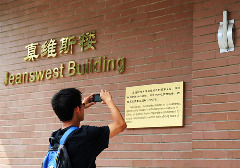| 
Tsinghua University, one of China's top academic institutions, a month after celebrating its centennial anniversary, has sparked fresh controversy through its naming of a campus building. Its No. 4 classroom building now bears the name of Jeanswest Building. Jeanswest Clothing is an Australian apparel store that chiefly sells casual clothes. Although detailed figures are undisclosed, Jeanswest reportedly donated hundreds of thousands yuan in order to buy the permanent rights to the building name. Obviously, its generosity was not received warmly by students and others.
Jeanswest is a popular brand, which is thought by many people to be incompatible to Tsinghua's academic eminence. Their commercial marriage looks odd, but we cannot say Jeanswest does not deserve gratitude from Tsinghua students and the public, just like other patrons who have made handsome donations to an educational institution. The problem primarily lies in the way that Tsinghua has handled the affair.
It is common to name a campus building after a patron. Universities do so to express gratitude and encourage public donations. Tsinghua has named many buildings in this way. However, the emerging Jeanswest building carries a glut of commercial interest. It seems to reward a commercial organization that naturally wants to maximize its profits by advertising on a campus building, rather than an actual person who wants nothing more than for their name to be remembered.
It does not mean all companies should be banned from naming a university building. A building like "Lenovo Building" is acceptable as it has a link to technology. The complete academic irrelevance of the Jeanswest Building added to the confusion.
The backlash generally suggests that the public does not want to see much commercialism in the ivory tower. There is a deep worry about how quickly and blatantly China's universities are departing from scholastic traditions, a process which remains more inevitable than condemnable. Universities can of course choose to embrace wealth in a fast growing country, if they can sincerely consider the implication this means for students and society.
It is inappropriate to name a classroom building after a trademark, as it sets a bad example to students. A building bearing a commercial sign, as if it was a stain, tells the students coming in and out that you can sell a serious place of learning for the purpose of advertising. It sounds as if the pursuit of knowledge is not superior to the pursuit of wealth, and that commercialism encroaches on the territory of academics.
Many universities can take lessons from Tsinghua and rethink where the border between academics and commercialism is, and whether it is wise to cross it. |

